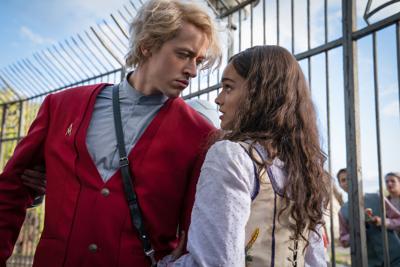“The Hunger Games” prequel film “Ballad of Songbirds and Snakes” poses common philosophical questions and answers them in a compelling way that left me hungry for more.
How thin is the line between man and animal? How thin is the one between right and wrong? When have we crossed too far and are no longer redeemable?
These are the questions addressed throughout the film. The main focus is the moral downfall of Coriolanus Snow, the future dictator of Panem.
From the beginning of the story, we know his outcome. What makes this story so enthralling is watching his downfall and potentially understanding how someone becomes as cruel and vindictive as Snow later is.
Viewers first see Snow as a small child during the civil war, fearing for his life. In the first part of the film, “The Mentor,” viewers see him desperate to keep his family afloat by earning the Plinth Prize money.
This innate need for survival led him to throw himself at his tribute, Lucy Gray, and in turn, fall in love with her. This love, though, and his friendship with Sejanus ultimately leads to his downfall.
In a further attempt to earn the Plinth Prize, Snow is forced to pull Sejanus from the arena as he mourns his fallen friend from District 2. After Snow kills one of the tributes, his “humanity is undressed,” as described by Dr. Gaul when she explains the thin line between humanity and beastliness later in the movie.
Viewers begin to see this humanistic and moral undoing. After this first kill, Snow tells Tigris killing the tribute felt powerful.
He then risks it all by ensuring Lucy Gray’s survival in the arena. This endangers his family, his standing in society and himself. This can been seen as a selfless act of love, but I believe it is something more animalistic — his impulsiveness.
After he is caught cheating the games, he finds his way to District 12 and back into the arms of the girl he loves. At this point in the film, there is a chance for him to remain “pure as the driven snow,” as Lucy sings in her song, but his perceived need to protect Sejanus and Lucy Gray leads to his second kill, Mayfair Lipp.
Snow spirals further, attempting to survive by betraying his only friend, Sejanus and getting him killed.
After this, Lucy Gray and Snow intend to run away together. This provides Snow the chance to wash away his sins and start a new life once again. Though again, he chooses the wrong path to ensure his own survival.
By the end of this film we see his humanity fully undressed when he kills Casca Highbottom as a form of self preservation despite Highbottom not being an immediate threat.
After each kill we see his humanity dissipate until he becomes the man the audience knows in the original Hunger Games series — self serving, inhumane and ruthless.
I finished the film wondering: How far have we fallen? Is life in Panem possible in real life?
As a society, are we really that different?















